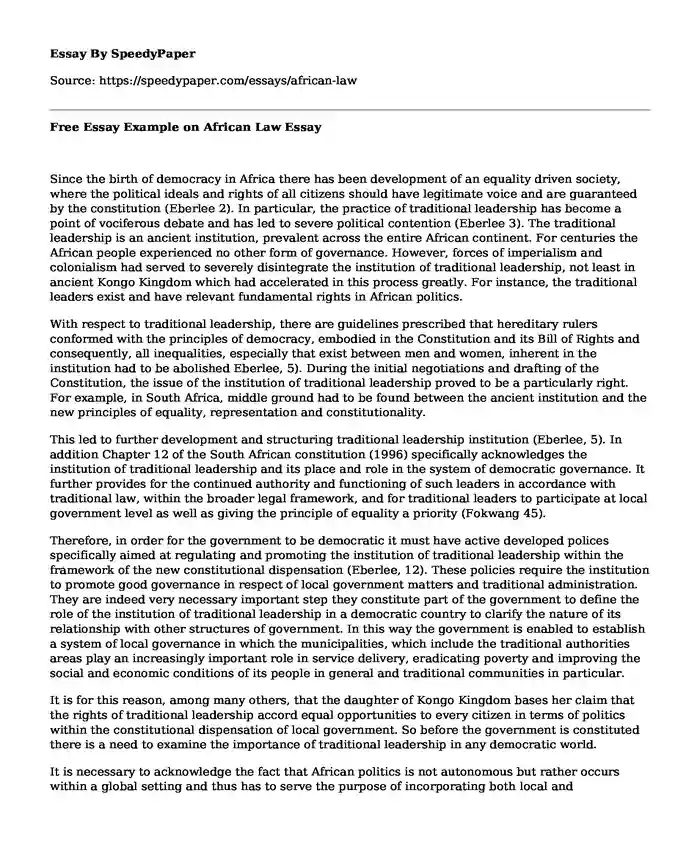
| Type of paper: | Essay |
| Categories: | Political science Government Democracy |
| Pages: | 3 |
| Wordcount: | 646 words |
Since the birth of democracy in Africa there has been development of an equality driven society, where the political ideals and rights of all citizens should have legitimate voice and are guaranteed by the constitution (Eberlee 2). In particular, the practice of traditional leadership has become a point of vociferous debate and has led to severe political contention (Eberlee 3). The traditional leadership is an ancient institution, prevalent across the entire African continent. For centuries the African people experienced no other form of governance. However, forces of imperialism and colonialism had served to severely disintegrate the institution of traditional leadership, not least in ancient Kongo Kingdom which had accelerated in this process greatly. For instance, the traditional leaders exist and have relevant fundamental rights in African politics.
With respect to traditional leadership, there are guidelines prescribed that hereditary rulers conformed with the principles of democracy, embodied in the Constitution and its Bill of Rights and consequently, all inequalities, especially that exist between men and women, inherent in the institution had to be abolished Eberlee, 5). During the initial negotiations and drafting of the Constitution, the issue of the institution of traditional leadership proved to be a particularly right. For example, in South Africa, middle ground had to be found between the ancient institution and the new principles of equality, representation and constitutionality.
This led to further development and structuring traditional leadership institution (Eberlee, 5). In addition Chapter 12 of the South African constitution (1996) specifically acknowledges the institution of traditional leadership and its place and role in the system of democratic governance. It further provides for the continued authority and functioning of such leaders in accordance with traditional law, within the broader legal framework, and for traditional leaders to participate at local government level as well as giving the principle of equality a priority (Fokwang 45).
Therefore, in order for the government to be democratic it must have active developed polices specifically aimed at regulating and promoting the institution of traditional leadership within the framework of the new constitutional dispensation (Eberlee, 12). These policies require the institution to promote good governance in respect of local government matters and traditional administration. They are indeed very necessary important step they constitute part of the government to define the role of the institution of traditional leadership in a democratic country to clarify the nature of its relationship with other structures of government. In this way the government is enabled to establish a system of local governance in which the municipalities, which include the traditional authorities areas play an increasingly important role in service delivery, eradicating poverty and improving the social and economic conditions of its people in general and traditional communities in particular.
It is for this reason, among many others, that the daughter of Kongo Kingdom bases her claim that the rights of traditional leadership accord equal opportunities to every citizen in terms of politics within the constitutional dispensation of local government. So before the government is constituted there is a need to examine the importance of traditional leadership in any democratic world.
It is necessary to acknowledge the fact that African politics is not autonomous but rather occurs within a global setting and thus has to serve the purpose of incorporating both local and international concerns. This will be important, when considering the extent to which traditional leadership will determine the nature of Africas democracy and thus the relevance of traditional leadership in a democratized Africa (Fokwang 55). This wider involvement of all institutions makes Africa governments be part of global political integration and accept that the political values of African democracy are a manifestation of ideas and practices from a global influence.
Works Cited
Eberlee, John. Enhancing the Role of Traditional Leaders in African Governance. 2001. Available from: http://www.idrc.ca/en/ev-5596-201-1-DO_TOPIC.html
Fokwang, John. Chiefs and Democracy in Comparative Perspective. University of Pretoria South Africa. 2003. pp 45-60
Cite this page
Free Essay Example on African Law. (2019, Aug 28). Retrieved from https://speedypaper.com/essays/african-law
Request Removal
If you are the original author of this essay and no longer wish to have it published on the SpeedyPaper website, please click below to request its removal:
- The National School Lunch Program Essay Sample
- Green Burials in Effort to Save Planet Earth - Free Essay on Environmental Issues
- Free Essay Containing the Principles of Public Administration and Public Affairs
- Essay Sample Dedicated to Effective Business Communication
- Paper Example: A Two-Way Statistical Influence
- The Hidden Faces of Sexual Assault in the Army. Essay Example
- Egypt Is a Gift of the Nile - Paper Example
Popular categories




